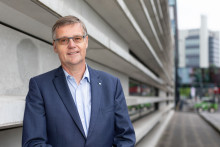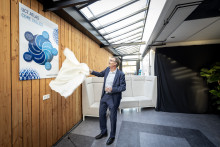What was your initial reaction to the evaluation report?
‘We were shocked by it and take the report very seriously. That is also the reason we are following the advice, by appointing Heleen Miedema as interim dean. I want to make it clear that this is absolutely not a formal reorganization, although that word was mentioned in a follow-up memo to the evaluation. Even though it is not a reorganization, there will be changes in governance, organization and collaboration.’
Where did things go wrong in your opinion?
‘What clearly emerges from the evaluation: there is no single culprit. Everyone wants the best for ATLAS: to deliver a beautiful and good programme out of full determination and commitment. But the problem is that the organization is currently not collaborating well. Considering ATLAS being a relatively small and close community, if something doesn’t go well, it quickly affects the entire community. In the same vein, the ATLAS students were unlucky with the corona crisis. While the Drienerburght was just finished as a new home base, a lot of education had to take place remotely. That doesn’t help, considering the programme’s strengths lie in small-scale, intensive education with lots of contact.’
Is there a chance that the plug will be pulled on ATLAS?
‘That is certainly not relevant now. Undoubtedly the University Council will discuss this with us later. First and foremost, we have an obligation to provide a good education for ATLAS students. As far as I am concerned, that goes beyond a discussion about efficiency and money. The university college has a broader function within the university, as a testing ground for new educational concepts and for the development of teachers, for example. We must increase the visibility of ATLAS’ role throughout the UT. The programme belongs to all of us.’
Where are the priorities now?
‘We emphasize that we are intervening now and that we are not going to let the problems linger. With Heleen Miedema as interim dean, we hope to have someone who can show integral leadership to get everyone on the same page. That is the first step. In addition, she is well versed in education and educational innovation, which will enable her to connect well when it comes to the content of the programme. Given the complexity of the situation, the problems are not solved overnight. I expect it will take at least a year. Again, I must stress it’s not a reorganization. We hope that the pieces will start moving and find their place under her leadership.’
How do you stay informed?
‘Heleen reports directly to me, so that we as the Executive Board are constantly well informed. The university college will still formally operate under the banner of ITC and receive support from the faculty.’
Do you understand students’ concerns about the value of their degrees?
‘I understand the source of their concerns, but I wouldn’t worry. The programme was recently accredited – laudably, by the way – and there are no signs that the quality of education is suffering from the organizational issues.’
Lastly, what next?
‘After the evaluation report I had good and valuable talks with those involved. I got the feeling that they were thinking along well in terms of solutions. I would say: let’s take a positive starting point. If we start off with a negative view, such a process quickly tends to become a self-fulfilling prophecy. In any case, the intentions are good. This, together with a laudatory accreditation and a sound curriculum content-wise, ensures that we have a good foundation to build on.’






